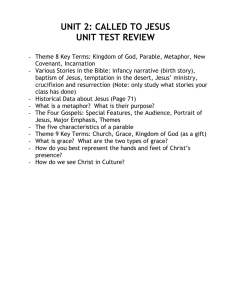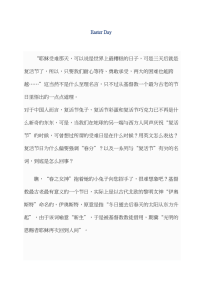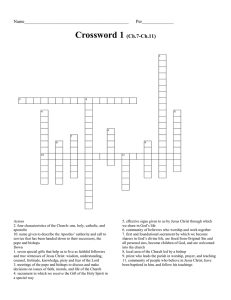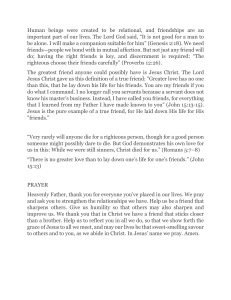Christian Living 12B Module: Holy Spirit & Moral Teachings
advertisement
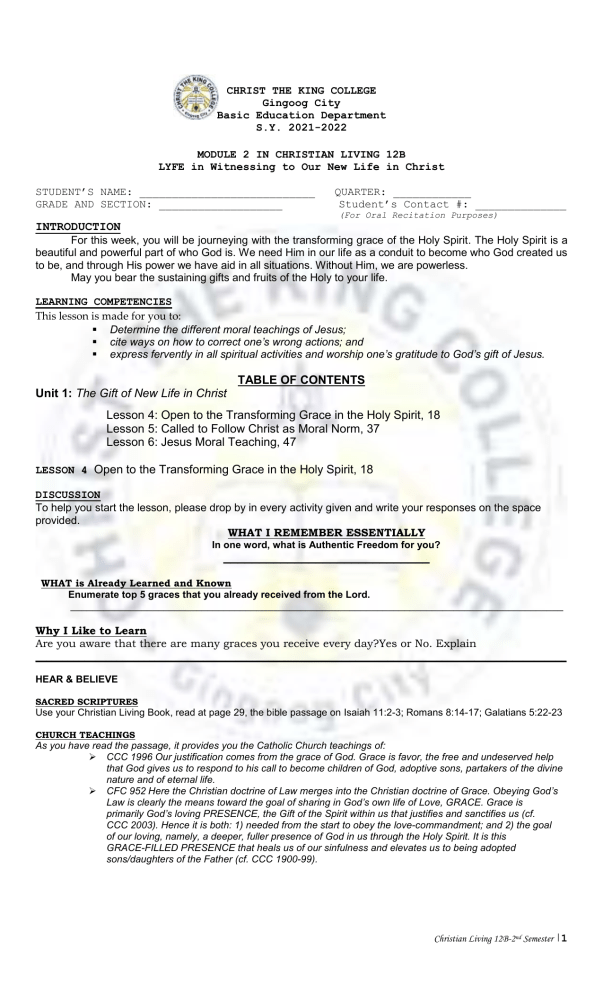
CHRIST THE KING COLLEGE Gingoog City Basic Education Department S.Y. 2021-2022 MODULE 2 IN CHRISTIAN LIVING 12B LYFE in Witnessing to Our New Life in Christ STUDENT’S NAME: ___________________________ GRADE AND SECTION: ___________________ QUARTER: ____________ Student’s Contact #: ______________ (For Oral Recitation Purposes) INTRODUCTION For this week, you will be journeying with the transforming grace of the Holy Spirit. The Holy Spirit is a beautiful and powerful part of who God is. We need Him in our life as a conduit to become who God created us to be, and through His power we have aid in all situations. Without Him, we are powerless. May you bear the sustaining gifts and fruits of the Holy to your life. LEARNING COMPETENCIES This lesson is made for you to: Determine the different moral teachings of Jesus; cite ways on how to correct one’s wrong actions; and express fervently in all spiritual activities and worship one’s gratitude to God’s gift of Jesus. TABLE OF CONTENTS Unit 1: The Gift of New Life in Christ Lesson 4: Open to the Transforming Grace in the Holy Spirit, 18 Lesson 5: Called to Follow Christ as Moral Norm, 37 Lesson 6: Jesus Moral Teaching, 47 LESSON 4 Open to the Transforming Grace in the Holy Spirit, 18 DISCUSSION To help you start the lesson, please drop by in every activity given and write your responses on the space provided. WHAT I REMEMBER ESSENTIALLY In one word, what is Authentic Freedom for you? _____________________________ WHAT is Already Learned and Known Enumerate top 5 graces that you already received from the Lord. __________________________________________________________________________________________ Why I Like to Learn Are you aware that there are many graces you receive every day?Yes or No. Explain __________________________________________________________________________________________________ HEAR & BELIEVE SACRED SCRIPTURES Use your Christian Living Book, read at page 29, the bible passage on Isaiah 11:2-3; Romans 8:14-17; Galatians 5:22-23 CHURCH TEACHINGS As you have read the passage, it provides you the Catholic Church teachings of: CCC 1996 Our justification comes from the grace of God. Grace is favor, the free and undeserved help that God gives us to respond to his call to become children of God, adoptive sons, partakers of the divine nature and of eternal life. CFC 952 Here the Christian doctrine of Law merges into the Christian doctrine of Grace. Obeying God’s Law is clearly the means toward the goal of sharing in God’s own life of Love, GRACE. Grace is primarily God’s loving PRESENCE, the Gift of the Spirit within us that justifies and sanctifies us (cf. CCC 2003). Hence it is both: 1) needed from the start to obey the love-commandment; and 2) the goal of our loving, namely, a deeper, fuller presence of God in us through the Holy Spirit. It is this GRACE-FILLED PRESENCE that heals us of our sinfulness and elevates us to being adopted sons/daughters of the Father (cf. CCC 1900-99). Christian Living 12B-2nd Semester |1 CFC 677. Left to ourselves, we have no power to fulfill Christ’s command: “Be perfect, just as your heavenly Father is perfect” (Mt 5:48). Yet God strengthens us by letting us share the life of Christ Jesus, through the Holy Spirit received in Baptism (cf. Rom 6:4). This Spirit, in uniting us to Christ, our risen Savior, as members of his Body, the Church, liberates and empowers us with new life to respond in our daily words and deeds to God’s love (cf. CCC 1742). Thus, as disciples of Christ, mutually supporting one another through the grace of the Holy Spirit, we come to exercise responsible freedom according to God’s loving design, as grasped by our gradually formed Christian conscience. THE DIFFERENT KINDS OF GRACE, 31 Sanctifying Grace Habitual Grace Actual Grace Sacramental Grace Special Grace Graces of State COVERSION THROUGH GRACE CFC 1775. Profession of Faith. Thus, to confess our sins in the sacrament of Penance is really to profess our Catholic Faith. By “going to Confession,” we implicitly affirm our FAITH convictions that: a. we are sinners; b. we need the mercy of God our Father who sent His Son to save us and the Holy Spirit to dwell within us; c. God’s mercy, always available to us, comes through: • Christ, the “Primordial Sacrament” of God’s mercy; • the Church, the “Fundamental Sacrament” of Christ; • the priest, representing both Christ and the Church. d. God calls us to conversion, that is, to be truly sorry for our sins, to “make up” for our sins and the sins of others, and to do better with the help of His Grace. e. The closer intimacy with Christ and re-integration in the Church community effected in confession finds a natural completion in the Eucharistic celebration. CFC 1778. But the Church not only calls sinners to repentance by preaching the Word of God. She also intercedes for them and helps penitents to acknowledge and confess their sins, and so obtain the mercy of God who alone forgives sins. For it is “to the whole Church, as to a priestly people, that the Lord entrusted the ministry of effecting reconciliation in various ways” (R Pen. 8). Thus, the Church herself becomes the instrument of conversion and absolution of her penitents through the ministry entrusted by Christ to the apostles and their successors” (Ibid). CFC 1780. Insistence on the whole process of conversion is perhaps the most striking change introduced by the present renewal of the Sacrament of Reconciliation (cf. CCC 1426 -30). PCP II made conversion one of its outstanding themes (cf. PCP II 64, 156, 189, 271-75). The Church, solicitous in calling the faithful to continual conversion and renewal, urges them to acknowledge their sins with heartfelt repentance, celebrate the sacrament of Penance, and attend penitential celebrations (cf. Decree, R Pen.). The Sacrament of Penance must be put against the wider horizon of the Christian virtue of penance, and within the whole process of conversion. “Going to confession” must be linked explicitly to the many other means the Church uses to bring about reconciliation, particularly the Sacraments of Baptism and Eucharist, and non-sacramental penitential services and devotions. CFC 1780. Insistence on the whole process of conversion is perhaps the most striking change introduced by the present renewal of the Sacrament of Reconciliation (cf. CCC 1426 -30). PCP II made conversion one of its outstanding themes (cf. PCP II 64, 156, 189, 271-75). The Church, solicitous in calling the faithful to continual conversion and renewal, urges them to acknowledge their sins with heartfelt repentance, celebrate the sacrament of Penance, and attend penitential celebrations (cf. Decree, R Pen.). The Sacrament of Penance must be put against the wider horizon of the Christian virtue of penance, and within the whole process of conversion. “Going to confession” must be linked explicitly to the many other means the Church uses to bring about reconciliation, particularly the Sacraments of Baptism and Eucharist, and non-sacramental penitential services and devotions. CFC 1854. What does “process of conversion” mean? Conversion is an ongoing process of constant turning a) away from sin and the occasions of sin, and b) toward renewing our spirit by: • acknowledging our sins, • being truly repentant, and • with firm purpose of amendment. CFC 1794. But this reconciling love of the grace of conversion is never imposed — we must freely accept and cooperate with it. Some do not. St. John tells us that “the light came into the world, but people preferred darkness to light, because their works were evil” (cf. Jn 3:19). For example, Jesus cured the paralytic at the pool and urged him to inner repentance: “do not sin anymore so that nothing worse may happen to you.” Unlike the healed man born blind who withstood all attacks against Jesus and ended by believing and worshipping him (cf. Jn 9:38), the healed paralytic did not even thank Jesus, but went off and informed the Jews that Jesus was the one who had cured him (cf. Jn 5:15). Matthew’s Gospel even describes the process of dealing with an unrepentant sinner in the community: first, private correction; then, cor-rection before two or three witnesses; finally, before the whole community. If even that fails, the sinner is to be expelled from the com-munity (cf. Mt 18:15-18). St. Paul explained how this apparently “harsh” excommunication is for the good of both the sinner and the community (cf. 1 Cor 5:1-5). Christian Living 12B-2nd Semester |2 STEPS IN THE COVERSION PROCESS (CFC 1855) What steps make up the conversion process? King David and the Prodigal Son show a four step process: • a certain conflict, followed by • an encounter, which brings • self-discovery, and leads to • personal transformation through God’s grace. ACTS OF THE PENITENT FOR INNER CONVERSION OF HEART CFC 1813. As followers of Christ, we come to the Sacrament of Penance to be converted to Christ with our whole hearts. Such inner conversion of heart embraces three essential acts of the penitent: 1) contrition or heartfelt sorrow (cf. CCC 1451-54); 2) confession of all grave/mortal sins to the priest, minister of the Church, acting in the person of Christ (cf. CCC 1455-58); and 3) penance/satisfaction for sins committed, by restitution and reparation of injury, and firm purpose of renewal of life (cf. CCC 1461ff). The essential act of the priest is absolution which is the efficacious sign of God’s pardon. DIMENSIONS OF TOTAL CHRISTIAN CONVERSION CFC 1797. Our daily ongoing Christian conversion has many dimensions. We spontaneously think of turning away from the self-centered pursuit of satisfying our own egotistical needs, and toward loving service of others (moral conversion). Such always involves our feelings, emotions, and imagination needed to support an out-going love that overcomes the temptations to prejudices, exaggerated amor propio, over-sensitivity, hatred and pride (affective conversion). But this re-direction of our affections can last only if grounded in a shift in the ways we understand and judge the basic meaning and value of our lives (intellectual conversion). Each of these three conversions actually contributes to a fourth which is really a “falling in love with God” (religious conversion). This happens through God’s grace, when we freely respond to the Father’s Self-giving through Jesus Christ His Son, in their Holy Spirit of undying LOVE. Note: Read furtherly in your CL Textbook the: Broadening of Horizons p. 33- LESSON 5: Called to Follow Christ as Moral Norm DISCUSSION To help you start the lesson, please drop by in every activity given and write your responses on the space provided. WHAT I REMEMBER ESSENTIALLY Among the gifts of the Holy Spirit, which do you still praying to acquire/receive? Why? WHAT is Already Learned and Known How will you know that the action is right or wrong? __________________________________________________________________________________________ HEAR & BELIEVE SACRED SCRIPTURES Get your Christian Living Book, read at page 39 on the bible passage on Psalm 19:8-10 CHURCH TEACHINGS CFC 796. Christ, Our Moral Norm. For Christians, the norm by which all their thoughts, words and deeds are judged and evaluated morally is not some law, but the person of Jesus Christ. In the Kingdom of God there is only one teacher: the Messiah (cf. Mt 23:10); all must listen to [his] words and put them into practice (cf. Mt 7:24), take up his yoke and learn from him (cf. Mt 11:29). Salvation depends on one’s attitude to Jesus: “Whoever acknowledges me before men, I will acknowledge before my heavenly Father. But whoever denies me before men, I will deny before my Father in heaven” (Mt 10:32f). “For if you confess with your lips that Jesus is Lord, and believe in your heart that God raised him from the dead, you will be saved” (Rom 10:9). Note: Read furtherly in your CL Textbook the: Broadening of Horizons p. 40-43 LESSON 6: Jesus’ Moral Teaching, 47 DISCUSSION To help you start the lesson, please drop by in every activity given and write your responses on the space provided. WHAT I REMEMBER ESSENTIALLY What makes Christ our moral norm? _______________________________________________________ Christian Living 12B-2nd Semester |3 WHAT is Already Learned and Known Can you give one (1) Moral Teaching that Jesus taught us? __________________________________________________________________________________________ Why I Like to Learn What makes you truly happy? __________________________________________________________________________________________ _________________________________________________________________________________________________ HEAR & BELIEVE SACRED SCRIPTURES Get your Christian Living Book, read at page 49 on the bible passage on Gal. Mt. 22:36-40 CHURCH TEACHINGS As you have read the bible passage, it provides you the Catholic Church teaching: CFC 961. Jesus’ Teaching. Beyond performing actual deeds of physical and spiritual healing of specific individuals, Christ taught the multitudes the good news of the Father’s redeeming love for all. He called them to respond to their ancient Law: “Love your neighbor as yourself” (Mt 19:19). But Jesus removed all limits to those whom we are called to love, even commanding “Love your enemies” (Mt 5:44). He upturned the accepted social priorities in his parable of the “Good Samaritan” (cf. Lk 10:29-37). To his chosen Twelve, the night before he died, Christ gave his own “new” commandment: “This is my commandment: love one another as I have loved you” (Jn 15:12). Finally, in depicting the Last Judgment, Christ identified himself with the least of his brethren (cf. Mt 25). In loving even the “least person,” we are loving Christ. Note: Read furtherly in your CL Textbook the: Broadening of Horizons p. 50-60. REFERENCE/S: Austria, Perfecto T. et.al. 2020. LYFE in Knowing and Following Christ More Closely https://www.vatican.va/content/francesco/en/encyclicals/documents/papafrancesco_20130629_enciclica-lumen-fidei.html https://chermercado.files.wordpress.com/2012/09/cfc-cbcp.pdf Reminder: Please take note the composition of your Performance Task. They are the following: 1. 2. 3. 4. 5. Monthly Graded Oral Recitation Daily Rosary Devotions Weekly BEC Attendance & Participation First Friday/Feast Day Mass Sunday Mass/Prayer Service Note: Submit all of these weekly: 1. 2. Online Students – submit in MS Teams Printed Modular – print a copy and post all of them in the worksheet of the modules (Make sure it is complete) FEEDBACK/COMMENTS: For questions and concerns, please contact: Gmail- joantirariray@ckcgingoog.ph.education Cellphone number- 09750852853 Messenger account- Joan Corporal-Tirariray Christian Living 12B-2nd Semester |4 WORKSHEET IN MODULE 2 CHRIST THE KING COLLEGE Gingoog City Basic Education Department S.Y. 2021-2022 MODULE 2 IN CHRISTIAN LIVING 12B LYFE in Witnessing to Our New Life in Christ STUDENT’S NAME: ___________________________ GRADE AND SECTION: ___________________ SCORE: ___/35 Student’s Contact #: ______________ (For Oral Recitation Purposes) Broadening of Concept a. What does Jesus say in terms of Moral Norm? ______________________________________________________________________________. What does it mean to be truly happy? _______________________________________________________________________________ Values Integration Activity (4-Pronged Integration) b. Ignacian-Core: Faith Related Values: Integrity How will be keep the moral teachings of Jesus ______________________________________________________________________________. c. Social Orientation: Cyber-bullying In this Flexible Distance Learning, how will you promote the moral teachings of Jesus? ______________________________________________________________________________. d. Lesson Across Discipline: AP (LAWS) How will you show good citizenship? ______________________________________________________________________________. SUMMARY: In one word, give your personal motto about living an upright life? _________________________________________________________________________________ _________________________________________________________________________________ _________________________________________________________________________________ . SELF-ASSESSMENT: Activity: Examine the three (3) lessons, reflect it to your personal experiences. Refer to page 51-57. Identify 10 wrong actions that you have done. Then, determine your violation against the will of God. And write your ways on how to avoid doing it again. Christian Living 12B-2nd Semester |5

